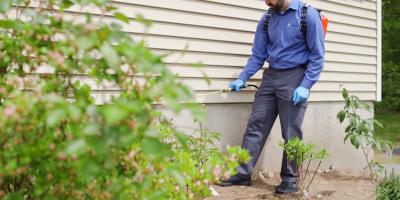PSA: Pest Control is a Community Effort

Your neighborhood watch keeps an eye out for burglars, but who’s on the lookout for critters in your community? Whether you rent or own, pest prevention is a concern everyone shares—and a responsibility everyone should assume.
As the population in cities throughout the country—and especially New England—increases, communities are becoming more close-knit. This housing density creates the perfect habitat for several invasive species, including rats, mice, fleas, cockroaches, and bed bugs, among many more.
When you band together with your neighbors to fight pest problems, whether you live in an apartment complex or on a cul-de-sac, the comprehensive effort is more effective than the sum of its parts. Here are some suggestions for fighting insects, rodents, and other invasive creatures as a team.
Don’t be That Neighbor
An old saying suggests you should make sure your side of the street is clean before you bug your neighbors about sweeping theirs. The first step in community-wide pest control is doing everything you can on your own property to minimize its appeal to insects and wildlife.
First off, keep your grass mowed and your foliage trim and neat. Not only does it beautify the neighborhood, but it also rids your yard of the most common places for pests to congregate.
Second, spray regularly for bugs. If you or a pest control professional sprays your house once per month, it won’t kill bugs on contact but it’ll create an effective barrier that should keep insects out of your home.
Third, cover your trash. This may seem obvious, but everything from flies to raccoons love garbage, or rather, the leftover scraps of food that tend to accumulate in our trash bins. Keeping your trash receptacles covered prevents flies from laying eggs (that turn into the grossest pests of all: maggots); as well as mice, rats and raccoons from feasting on the remains of your week-old pizza.
Finally, if you have any yard ornamentals or fixtures, move them around about once a week. Not only will the neighbors start wondering if those little garden gnomes are actually alive, you’ll disrupt any insect dwellings that have started to form underneath and around your decorations.
Report That Neighbor
Whether you live in a neighborhood with a homeowners’ association (HOA) or not, most communities have regulations about how unkempt a yard can be before the municipality comes in to take care of it (at a cost, of course, to the homeowner).
There’s a host of violations you can typically report your neighbors for; including an overgrown lawn, inoperable vehicles, altering drainage paths, and using the outdoors as a storage area for all of their extra stuff. These disruptions increase the likelihood that critters will find a home on your neighbor’s lot, which puts them one step closer to encroaching upon yours.
Reporting violations such as these doesn’t make you a tattletale. As with most things, when it comes to pest control there’s strength in numbers. That one house down the street with a yard full of waist-high weeds and a muscle car up on blocks could be the weakest link causing your community to be overrun with pests.
And just because you haven’t seen any rats, mice or roaches doesn’t mean they aren’t lurking in the shadows. Most invasive pests are more scared of humans than we are of them. By the time you actually do see one or more of them, the problem is already out of control.
It’s a Numbers Game
If you can get all your neighbors onboard with routine pest control, everyone will be able to have a little more peace of mind. Regular pest maintenance is the most effective way to keep chronic, repetitive pest issues from disrupting your home and the homes throughout your neighborhood.
To make sure that you’re doing your part to keep pests out of your neighborhood, contact us for a free quote on our Home Protection Plan, designed to deliver peace of mind against 50 of New England’s most problematic pests.



